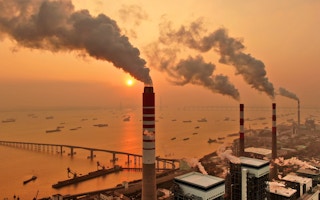Hyundai Engineering and Construction today declared an exit from its coal power construction business but will proceed with plans to build at least one more coal venture in Vietnam and potentially other “ongoing projects”, a letter seen by Eco-Business reveals.
To continue reading, subscribe to Eco‑Business.
There's something for everyone. We offer a range of subscription plans.
- Access our stories and receive our Insights Weekly newsletter with the free EB Member plan.
- Unlock unlimited access to our content and archive with EB Circle.
- Publish your content with EB Premium.
The announcement comes amid growing criticism from civil society groups that the South Korean construction firm’s latest coal project contradicts its own sustainability policy, as it fuels an increase in emissions overseas and jars with national emissions targets at home. Coal burning is the single biggest driver of human-caused climate change.
Last month, Hyundai E&C was selected as one of the contractors for the construction of the 1,200-megawatt Quang Trach 1 power plant by Vietnamese state-utility EVN, along with Vietnam’s No. 1 Construction Corporation and Japan’s Mitsubishi Corporation. The US$1.8-billion project is slated to be completed within 48 months.
In the letter, sent to a coalition of civil society groups on 21 July, the company said it had decided to “totally exclude the possibility” of participation in any newly built coal-fired power plant projects either in South Korea or abroad, subsequently to the fulfilment of contractual commitments to ongoing projects.
It did not specify how many projects are currently in the pipeline. The company was not available for comment.
Hyundai E&C’s chief executive officer Young-Joon Yoon said the company had reviewed the climate threats associated with coal and “came to a conclusion to officially release the ‘Hyundai E&C declaration on Coal Exit’”.
Yoon said the firm had “become more aware of the visible, sometimes invisible, risks of coal power projects” and was determined to transform its business strategies in response to the climate crisis, pursuing “sustainable growth” that “goes beyond improving short-term business performance”.
However, he defended the firm’s involvement in Quang Trach 1, stressing that it was of “national priority” to the Southeast Asian nation to address rising power shortages amid rapid energy demand growth.
The plant would also be equipped with less polluting ultra-supercritical coal combustion technology and other emissions control technologies to reduce environmental harm, he added.
Hyundai E&C’s letter comes in response to another letter sent by civil society groups Mekong Watch, Market Forces, Friends of the Earth Japan and Fridays for Future to the construction firm earlier this week, which highlighted the project’s vast climate change impact and detailed complaints from local communities in Vietnam that they had not been appropriately compensated and remained concerned about environmental pollution.
The letter also warned the deal would be viewed “as one of the worst examples of greenwashing”. Claims that the coal industry can clean up its act and play a role in the energy transition have been on the rise across Asia, with novel combustion technologies allegedly capable of delivering net efficiency rates of up to 47.5 per cent, higher than the global average of 34 per cent. But experts have called such claims into question and cautioned that they could slow the shift away from the fuel, making it difficult for renewables to gain ground.
Seoul-based climate policy advocacy group Solutions for our Climate (SFOC) has responded to Hyundai E&C’s latest letter, calling on the construction company to withdraw from its latest coal venture.
In a statement, it said the decision to back the project reflected an “alarming trend” of South Korean firms still pursuing coal business abroad that undermined the government’s ambition to end state funding of coal power overseas, a pledge President Moon Jae-in made in April this year.
The group pointed out that Hyundai’s E&C’s bid was at odds with its commitment to environmental, social and corporate governance (ESG) principles, laid out in its ‘2050 Global Green One Pioneer’ vision, and its self-branding as a responsible business leader.
Sejong Youn, SFOC’s climate finance programme director, said the plan to build the plant “defeats the sincerity of the company’s coal exit, and contradicts its own attempts to build a reputation as a forward-thinking and sustainable company”.
“In the face of growing concern about the climate crisis, investors and customers will no doubt be shocked that Hyundai would still take a financial and reputational gamble. This affects not just Hyundai E&C but reflects poorly on the Hyundai Group as a whole,” added Youn.
Hyundai Motors, the largest shareholder of Hyundai E&C, recently joined the RE100 initiative, a global group of corporates committed to using renewables in their operations.
SFOC added that Hyundai E&C’s decision was all the more surprising given the controversy around another recent coal deal, the 1,000-MW Cirebon 2 coal-fired plant in Indonesia, in which Hyundai E&C admitted to bribing the former district head of Cirebon to muffle local resistance to the project.










